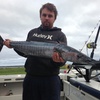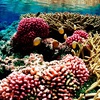
Great Barrier Reef: Signs of recovery despite major coral bleaching
THE Great Barrier Reef’s most popular tourist sites show just two per cent of coral has died off, with the rest in “positive” signs of recovery, despite the world’s biggest mass coral bleaching event on record. New research found about 68 per cent of reefs from Cairns to Lizard Island had varying levels of coral bleaching, but most of it likened to sunburn on a human body where the coral glows …




















